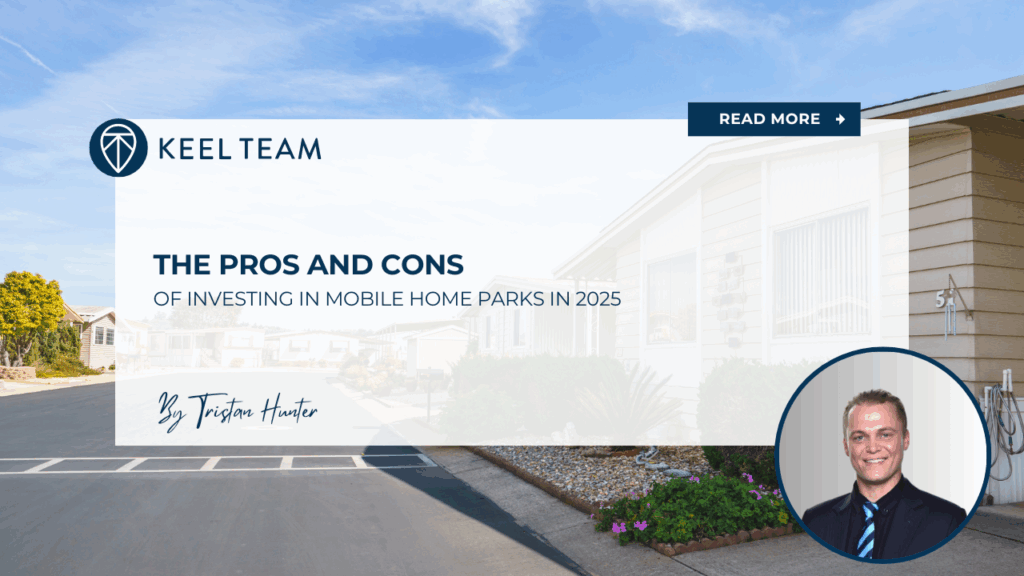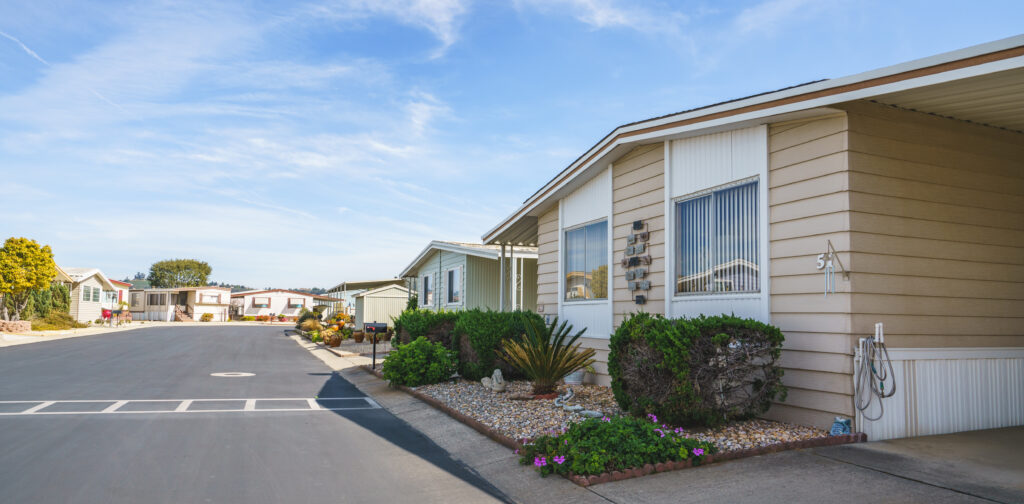The Pros and Cons of Investing in Mobile Home Parks in 2025
-
 Tristan Hunter - Investor Relations
Tristan Hunter - Investor Relations

Mobile home park investing has emerged as a compelling opportunity in the real estate market, attracting both seasoned investors and newcomers. With the potential for high cash flow and the growing demand for affordable housing, mobile home parks may offer unique advantages. However, challenges like financing hurdles and infrastructure issues could pose risks. This article explores the pros and cons of investing in mobile home parks in 2025, helping you make informed decisions. Let’s dive into the common benefits and drawbacks to see if this niche aligns with your investment goals.
Why Mobile Home Parks Are Gaining Attention
Mobile home parks provide affordable housing for millions of Americans, with approximately 20.9 million people living in mobile homes, according to recent housing data. As traditional home prices soar, these communities may fill a critical gap, offering low-cost living options. For investors, mobile home parks could deliver stable returns due to consistent demand and low tenant turnover. However, like any investment, they come with complexities. Below, we break down the key advantages and potential pitfalls.
The Pros of Investing in Mobile Home Parks
High Cash Flow Potential
Mobile home parks may generate strong cash flow, often surpassing traditional multifamily properties. Since tenants typically own their mobile homes and rent the land, investors might face lower maintenance costs. For example, lot rents could range from $300 to $600 per month, and with 50 lots, monthly revenue may reach $15,000 to $30,000. Additionally, vacancy rates tend to stay low—often below 5%—because moving a mobile home is costly, encouraging tenants to stay long-term.
Affordable Entry Point
Compared to apartment complexes, mobile home parks might require a lower initial investment. While a small apartment building could cost millions, a mobile home park with 20–50 lots might be acquired for $500,000 to $2 million, depending on location and condition. This lower barrier to entry could allow smaller investors to enter the market and diversify their portfolios.
Tax Advantages
Investing in mobile home parks may offer tax benefits. Land improvements, such as roads and utilities, might depreciate over 15 years, faster than the 27.5 years for residential properties. Additionally, mobile homes owned by tenants are often classified as personal property, potentially reducing property tax burdens. Investors might also deduct expenses like management fees and maintenance costs, further enhancing returns.
Download our FREE eBook on the Top 20 things to know BEFORE investing in mobile home parks!
Recession Resistance
Mobile home parks could perform well during economic downturns. As housing costs rise, more people may turn to mobile homes for affordability. During past recessions, mobile home parks often maintained high occupancy rates, as tenants prioritized cost-effective living. This resilience might make them a safer bet in uncertain economic times.
Value-Add Opportunities
Mobile home parks often present opportunities to increase value. Investors might raise lot rents to market rates, fill vacant lots with new homes, or add amenities like playgrounds or community centers. For instance, purchasing a 44-unit mobile home park for $385,000 and increasing its value to $1.3 million is possible by improving infrastructure and raising rents. Such strategies could significantly boost net operating income potential.
The Cons of Investing in Mobile Home Parks
Financing Challenges
Securing financing for mobile home parks can be difficult. Many lenders may view these properties as riskier than traditional real estate, leading to stricter loan terms or higher interest rates. Commercial loans might require 25–30% down payments, and some banks may avoid mobile home park deals altogether. Seller financing or syndications could help, but these options may limit your choices or involve complex partnerships.
Infrastructure Risks
Older mobile home parks might have outdated utilities, such as private septic systems or master-metered electric grids. These issues could lead to costly repairs, with septic system replacements potentially exceeding $50,000. Investors should conduct thorough due diligence, including utility inspections, to avoid unexpected expenses. Neglecting these risks might erode profits.
Management Demands
Managing a mobile home park could be time-intensive. Tasks like tenant screening, rent collection, and maintenance oversight might require active involvement or hiring a property manager, which could cost 8–10% of gross revenue. Additionally, tenant disputes or evictions, though rare, might demand careful handling to comply with local regulations. Investors unprepared for these responsibilities could face operational challenges.
Negative Stigma
Mobile home parks sometimes carry a negative stereotype, often associated with “trailer parks” or low-income housing. This stigma might deter potential tenants or complicate community relations. Investors may need to invest in rebranding efforts, such as upgrading amenities or marketing the property as a vibrant community, to attract quality tenants. Overcoming public perception could require time and resources.
Regulatory and Zoning Hurdles
Mobile home parks are subject to local zoning laws and regulations, which might restrict expansion or rent increases. Some municipalities may impose moratoriums on new mobile home park development, limiting supply but also complicating approvals for upgrades. Investors should research local policies carefully, as non-compliance could lead to fines or legal issues.

Key Considerations for 2025
Market Trends
In 2025, mobile home parks might see increased interest from institutional investors, such as private equity firms, which could drive up acquisition costs. For example, recent deals show firms purchasing mobile home parks for $9 million after upgrades, up from $950,000. While this trend may signal strong market confidence, it could make it harder for smaller investors to compete. Staying informed about local market dynamics might help you identify undervalued opportunities.
Economic Factors
Rising interest rates and inflation could impact mobile home park investments. Higher borrowing costs might reduce purchasing power, while inflation could increase operating expenses. However, the demand for affordable housing is likely to remain strong, potentially offsetting these pressures. Monitoring economic indicators might guide your timing and strategy.
Ethical Considerations
Investors should consider the social impact of their decisions. Raising lot rents to maximize profits could strain tenants, many of whom rely on mobile homes for affordable living. Balancing profitability with tenant well-being might foster long-term stability and community goodwill. For example, offering gradual rent increases or investing in amenities could maintain tenant satisfaction.
How to Get Started
If you’re considering mobile home park investing in 2025, start by researching markets with high demand for affordable housing, such as rural areas or regions with rising home prices. Network with brokers specializing in mobile home parks and attend industry events to find deals. Use tools like rental property calculators to evaluate potential returns, aiming for cap rates around 8–10%. Finally, partner with experienced inspectors and legal advisors to navigate due diligence and regulatory requirements.
Is Mobile Home Park Investing Right for You?
Mobile home park investing in 2025 could offer compelling opportunities, with potential for high cash flow, tax benefits, and recession resistance among the key draws. However, financing challenges, infrastructure risks, and management demands may require careful planning. By weighing these common pros and cons, you can decide if this niche aligns with your financial goals and risk tolerance. With thorough research and strategic execution, mobile home parks might become a valuable addition to your investment portfolio.
Are you looking for MORE information? Book a 1-on-1 consultation with Andrew Keel to discuss:
- A mobile home park deal review
- Due diligence questions
- How to raise capital from investors
- Mistakes to avoid, and more!
Disclaimer:
The information provided is for informational purposes only and is not investment advice or a guarantee of any kind. We do not guarantee profitability. Make investment decisions based on your research and consult registered financial and legal professionals. We are not registered financial or legal professionals and do not provide personalized investment recommendations.

Tristan Hunter - Investor Relations
View The Previous or Next Post
Subscribe Below 👇





